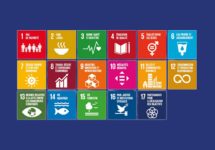
Despite the difficulties of achieving the SDGs, pointed out by the UN, due to the current geopolitical tensions, they remain an invaluable tool for companies.
"CSR" and "SDGs": continuity and a common frame of reference for all stakeholders
CSR and the SDGs are intimately linked. Incorporating the SDGs into CSR strategy is relevant given that the SDGs embody a common language for all local, national and international stakeholders and their targets provide useful benchmarks for action and evaluation.
17 goals supported by the United Nations between now and 2030
The Sustainable Development Goals are the blueprint to achieve a better and more sustainable future for all. They address the global challenges we face, including those related to poverty, inequality, climate change, environmental degradation, peace and justice. The 17 Goals are all interconnected, and in order to leave no one behind, it is important that we achieve them all by 2030.
Recommendations made by a group of committed stakeholders
With the aim of speeding up the achievement of the 2030 Agenda through a reinforcement of ties between CSR and the SDGs, experts from the CSR Platform's various divisions have put forward 15 recommendations resulting from the work of 28 members, 11 expert hearings and 12 working group sessions. These recommendations, which draw on the knowledge and experience of each of the Platform's members, focus on four key areas:
- Measure, evaluate and monitor: ensure consistency with existing mandatory reporting indicators, particularly those defined as part of the CSRD directive, in order to have the same set of indicators available over time, or work with stakeholders to ensure that the French National Institute of Statistics and Economic Studies (INSEE)'s SDG indicators enable businesses' real contributions to the SDGs to be better assessed and evaluated.
- Finance: pursue major actions undertaken by France as part of the reform of the global financial governance and mobilise more private funds in accordance with SDG 17 or ensure that public financing and procurement are better directed towards businesses whose actions make a proven contribution to the achievement of the SDGs.
- Sectorise, train and support: include in vocational training the development of the skills needed to implement CSR actions in line with the SDGs.
- Mobilise and federate at different levels: integrate the SDGs into ecological, national and regional planning, so that targets related to the SDGs can bring greater coherence to public action, and can guide and stabilise businesses' strategies for the future, including investment, particularly in R&D.
Effective consideration of the SDGs in CSR strategies, which needs to be strengthened
Halfway through the 2030 Agenda, the CSR Platform is also drawing up an international, European and national assessment of the extent to which companies are taking account of the SDGs in their CSR strategies.
This analysis takes place in an ever-changing european regulatory framework, requiring businesses to report on their sustainability performance. It shows that few companies are using the SDGs and their targets as levers for transforming their business models.
The SDGs: more than a compass, a lever for transforming business models
The new European regulatory obligations that incorporate stakeholders' expectations are an opportunity to adapt, rethink and reinvent their business models. SDGs are a facilitating tool in the implementation of the Corporate Sustainability Reporting Directive (CSRD), a compass that enables businesses to guide and structure their actions.
The CSR Platform has identified various barriers to overcome and levers to pull to enable businesses to incorporate SDGs and their targets into their CSR strategies. The following document highlights the uneven support of the SDGs within public administrations and business bodies alike, the lack of coherence between teaching programmes and current issues, and the difficulties in carrying out an impact analysis of businesses' contributions to the SDGs. The sectorisation and territorialisation of the SDGs and the development of so-called "impact finance" have been identified as real levers.




